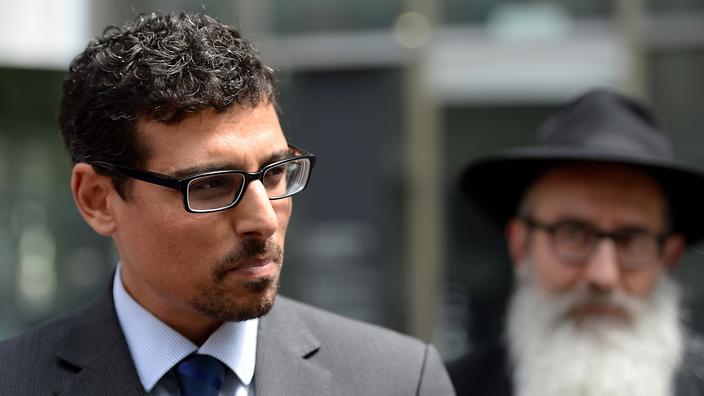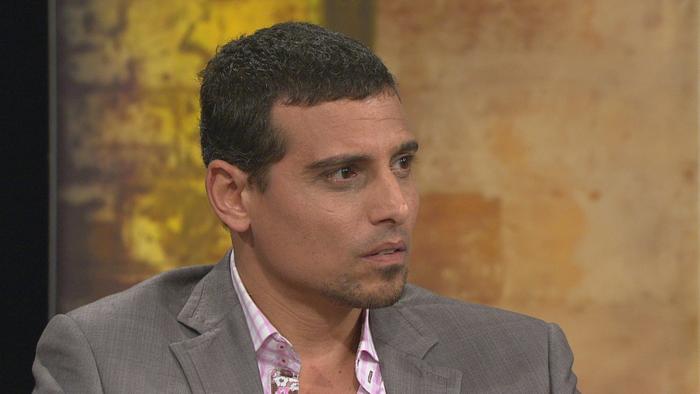Victim advocacy a 'double-edged sword'
SBS
Manny Waks
21 March 2017
 Manny Waks talking to the media with his father in 2013 (photo: AAP).
Manny Waks talking to the media with his father in 2013 (photo: AAP).
When Manny Waks went public with his experience of childhood sexual abuse in Melbourne's ultra-Orthodox Jewish community, he fell into a position advocating for fellow survivors. It's been rewarding, but has taken a high toll on his own recovery. He writes about his experience.
Warning: readers may find descriptions in this article distressing. Please contact Lifeline for immediate crisis support on 13 11 14, or beyondblue for online counselling.
When I went public in 2011 with my story of how I had been sexually abused as a child by two separate perpetrators within my Orthodox Jewish school and community, and how the leaders of that community had enabled and then covered up these crimes, I had no idea of the impact that would have.
Fast forward six years and we have seen several perpetrators brought to justice, organisations and leaders held to account, a number of other victims seeking accountability for the abuse they suffered, two Royal Commission public hearings into the Yeshivah Centre and Chabad institutions in which I was raised, and a revolution in terms of awareness, education and prevention within the Jewish community and particularly the more Orthodox segments of that community, not only within Australia but globally.
And yet despite these achievements and milestones, my own personal trauma and suffering has only intensified. The personal cost of the work I continue to do, has been enormous.
 Manny Waks, on Insight
Manny Waks, on Insight
Practically from the moment my story hit the airwaves, my community turned on me and my family for exposing the horrific failures of their leadership. We were subject to the worst forms of intimidation and shunning which ultimately forced us to leave our homes and move overseas. The trauma experienced by the hypocritical response of my community, including our leadership, one which preaches love and care for all but especially those less fortunate, has been every bit as severe as that caused by the abuse itself. Although (in many cases belated and forced) apologies and accountability ultimately prevailed, the scars remain and will no doubt take their time to heal.
From the moment I spoke out in 2011, I found myself thrust into the role of advocate and supporter for many victims and survivors who contact me to tell me their story. It was not the role I chose, but rather it was imposed on me, and I accepted it.The stream of calls and messages are constant, from all over the world and often, at all hours of the day. And not just from the Jewish community. Sometimes people tell their story to me for the first time, occasionally they seek advice and other times they tell me about the positive impact my coming forward has had on them. I am pleased to be able to offer other victims and survivors someone to whom they can turn. This is a way I can give back and help others who have had similar experiences to me.
But it is a double edged sword. My advocacy and support for other victims and survivors has not always been good for me and has not necessarily aided my recovery. Knowing and seeing the positive impact my work is having provides me with the encouragement to continue, and at times seems to assist in my personal healing process. However, the vicarious trauma by being repeatedly exposed to horrific stories of abuse has presented yet another challenge for me to handle.
Will I always be a 'victim' or at some point, will I be a 'survivor' or even a 'thriver', to use the terms that I hear bandied about? To be honest, I don't know. Although the question becomes all the more interesting in the context of being a member of the Jewish community, which includes so many Holocaust survivors. Despite having experienced the worst dehumanisation and loss imaginable, we only ever hear the term Holocaust 'survivor' and never Holocaust 'victim'. And as we look at the family lives, accomplishments and contributions to society of these survivors, it is apparent that their responses defy everything that the study of trauma would suggest was possible.
I do not know whether my life is destined to be defined by the direct and indirect trauma that I have experienced. Whatever the case, I know that I have a long road ahead in my recovery before I can start to answer this question. Until then, I'm simply one of many who experienced a significant form of trauma as a child, and currently doing my best to address it on behalf of myself and many others. And, despite the high price my family and I continue to pay, I intend to continue this critical work until I am no longer in a position to do so.
Originally published at SBS.